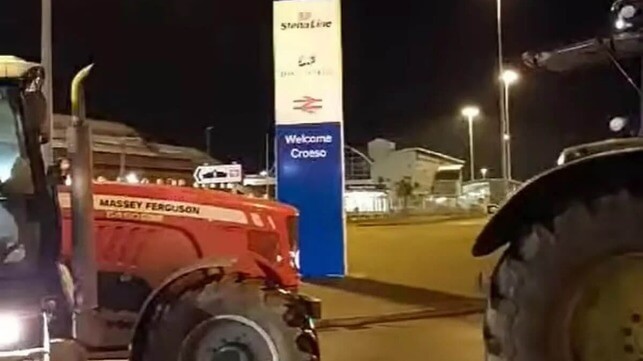Video: British Farmers Block Ferry Ports to Protest Government Budget
REACTIONARY LAND OWNERS WHO USE FARM LABOUR

Farmers across the UK are angrily speaking out against the proposed Labour Government budget which they say is the latest blow to their way of life and the future of the UK’s farms. Seeking to influence the government and call attention to their demands, the farmers have staged a series of protests and overnight blockaded the Welsh port of Holyhead.
According to media reports, around 40 to 50 farmers turned out to the port of Holyhead shortly after 10 p.m. local time on Wednesday, November 27. Farmers took the roads on their tractors and blocked the primary exit from the port shortly before the evening ferry from Ireland was due to arrive at 10:30 p.m. local time.
Stena Line which operates the ferry port and the port authority confirmed that the access roads were blocked. The farmers were carrying signs including “No Farmers No Food No Future.” Traffic Wales reported “heavy congestion” in the port area that continued till approximately 0400 Thursday morning when the farmers left in what organizers called a “peaceful protest.”
Foot traffic and private cars were permitted to leave the ferry and the port area via a separate gate. Trucks however were stranded in the port during the protest.
The farmers are demonstrating against what they called a “disastrous budget,” and a long heritage of anti-farm policies. They are incensed over a government proposal in the new budget that would impose a 20 percent inheritance tax starting in 2026. Farms and groups including Save British Farming and the Farmers for Farmers of Kent argue farmers will be forced to sell their properties to pay the tax.
Chancellor Rachel Reeves responded for the government saying that “only a very small number of agricultural properties” will be affected.
The farmers began their protest including a march on London which was called a landmark event. Reports said more than 10,000 farmers and their supporters descended on London to express their anger and demand changes including excluding agricultural land from the inheritance tax. Organizers called the London march a “warm-up act” promising to continue their protests.
During the day on Wednesday, November 27, farmers also took to the roads in Dover another of the UK’s busiest ports. Reports said at least 100 tractors drove through the streets of Dover going slow to disrupt traffic. They called on the government to “stop betraying British farming and rural communities.”
Farmers in France last week also blocked the port of Bordeaux with a protest over French and EU trade regulations. They were calling for stopping an agreement to increase trade between the EU and South America. The French organizations, like their British counterparts, have promised to return with more protests at French ports.
By AFP
November 28, 2024

Protesters erected a brick wall in front of France's agricultural research institute - Copyright AFP Gregoire CAMPIONE
French farmers blocked off entrances to two public buildings in Paris on Thursday in protest at “constraints” imposed by regulatory agencies, which they say result in lost production.
Around 100 farmers erected a cardboard wall in front of France’s food safety agency ANSES, south of Paris, after placing breeze blocks barring the way into INRAE, the country’s agricultural research institute in the capital.
This follows demonstrations on Tuesday against a planned free trade deal between the European Union and South America’s Mercosur bloc, which France opposes over concerns it would hurt its domestic agricultural industry.
Farmers fear any agreement would open EU markets to cheaper meat and produce from South American competitors, who are not forced to adhere to strict EU rules on pesticides, hormones, land use and environmental measures.
Thursday’s protesters — led by the heavyweight FNSEA farmers’ union — say they are also feeling the sting of restrictions imposed by France’s regulatory agencies on products like insecticides.
There are no “effective, alternative solutions”, said Remi Pierrard, a beet and cereal grower in the town of Provins, who said he has seen “productivity losses of up to 50 percent each year”.
“We’ve been banned from using an insecticide that protected beetroot. Now we have to use a sprayer, which is far less effective,” Pierrard said.
The French government says that pesticides pose a danger “health and the environment”, with exposure to the chemicals linked to cancer and Parkinson’s disease.
Farmers say that institutions like INRAE could help them be more efficient but are instead foisting regulations on them that undermine production.
“We’re funding a national institute that costs a billion euros a year but all it does is impose constraints on us,” said the head of a young farmer’s association, Donatien Moyson, referring to INRAE.
“We’re here to fight against obstacles to agriculture,” he added.
Elsewhere, farmers in the southern city of Nice dumped manure and sheep’s wool in front of the regional prefecture, according to local press.
French Agriculture Minister Annie Genevard condemned the protests as “attacks on people and property”, telling AFP such actions “undermine the legitimate demands of farmers”.

No comments:
Post a Comment